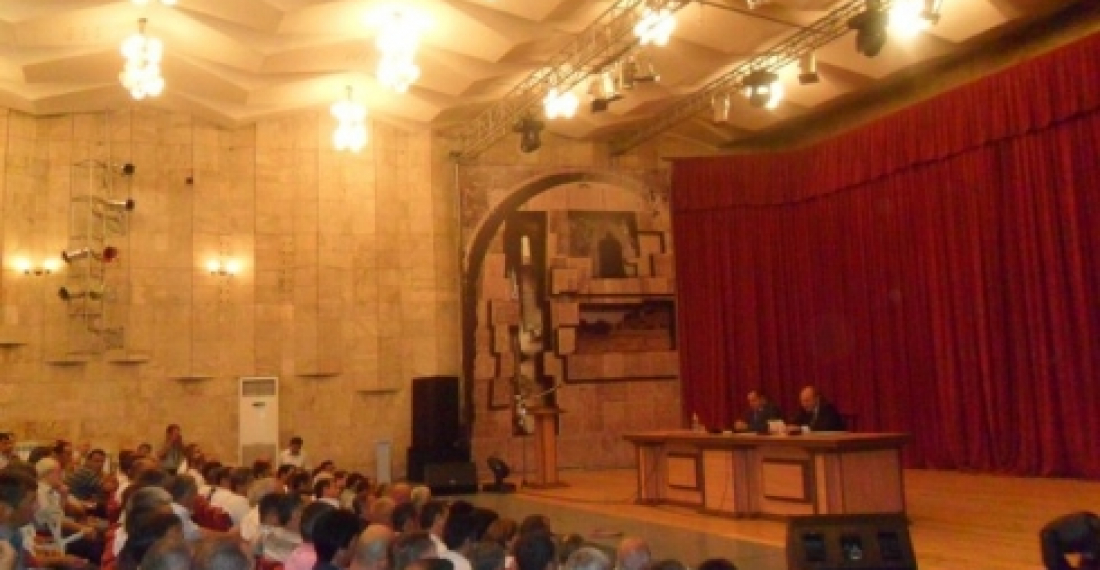Предвыборная кампания в самопровозглашенной Нагорно-Карабахской Республике завершилась, впереди выборы в четверг, на которых изберут пятого по счету президента. Среда является днем размышлений и в этот день не допускается никакой политической деятельности.
В выборах принимают участие три кандидата: действующий президент НКР, Бако Саакян, бывший заместитель министра обороны, Виталий Баласанян, а также заместитель директора Степанакертского филиала Государственного аграрного университета Армении по научно-образовательной части Аркадий Согомонян. Валерий Хачатрян, четвертый кандидат, обратился с официальным отказом от участия в выборах к Центральной избирательной комиссии в понедельник, 9 июля.
Саакян является фаворитом на победу, но испытывает серьезное давление со стороны Баласаняна, который привлек поддержку многих карабахских оппозиционных сил, которые считают правление Саакяна периодом застоя. Саакян провел традиционную предвыборную кампанию, обещая перспективы стабильности и последовательности. Оба кандидата обещали усилить безопасность Карабаха от угроз Азербайджана.
Бако Саакян зарезервировал последнюю агитационную встречу с ветеранами войны с Азербайджаном. Обращаясь к ним во Дворце культуры в Степанакерте, он пообещал, что жилищные и другие проблемы ветеранов будут решены в течение его второго срока, в случае его избрания. Ветераны составляют большую и важную часть электората.
Правительство Азербайджана назвало выборы еще одной армянской попыткой оправдать статус-кво и заявило, что они препятствуют мирному процессу. Пресс-секретарь МИД Азербайджана, Эльман Абдуллаев, заявил, что "выборы на оккупированных территориях Азербайджана являются попыткой армянской стороны зафиксировать нынешний статус-кво, неприемлемость которого признана мировым сообществом".
В то же время, вопрос о наблюдении за выборами в Карабахе также создает некоторые противоречия. Выступая на встрече ОБСЕ в Вене, на прошлой неделе, делегаты от Азербайджана обратились к государствам-членам ОБСЕ с просьбой не позволять их гражданам ехать в Нагорный Карабах для участия в наблюдении за выборами. Однако, кипрские СМИ сообщили, что греческий киприот, член Европейского парламента, Элени Теохарус, собирался отправиться в Карабах для участия в выборах. Армянские средства массовой информации также опубликовали фотографии канадской парламентской делегации в Ереване, на встрече с главой МИД Армении, Эдвардом Налбандяном, до поездки в Степанакерт для участия в наблюдении за выборами. Министерство иностранных дел Азербайджана в очередной раз предупредило, что внесет иностранцев, посещающих Нагорный Карабах в черный список, и в дальнейшем они не смогут посетить Азербайджан.
Источник: commonspace.eu
Фото: Бако Саакян во время своей предвыборной кампании во Дворце культуры в Степанакерте, в преддверии выборов в четверг. (Фото любезно предоставлено информационно-аналитическим сайтом Artsakh Today).
Commentary
Агитация в преддверии завтрашних выборов в Нагорном Карабахе завершена. Правительство Азербайджана заявляет, что выборы препятствуют мирному процессу и направлены на укрепление статус-кво.







